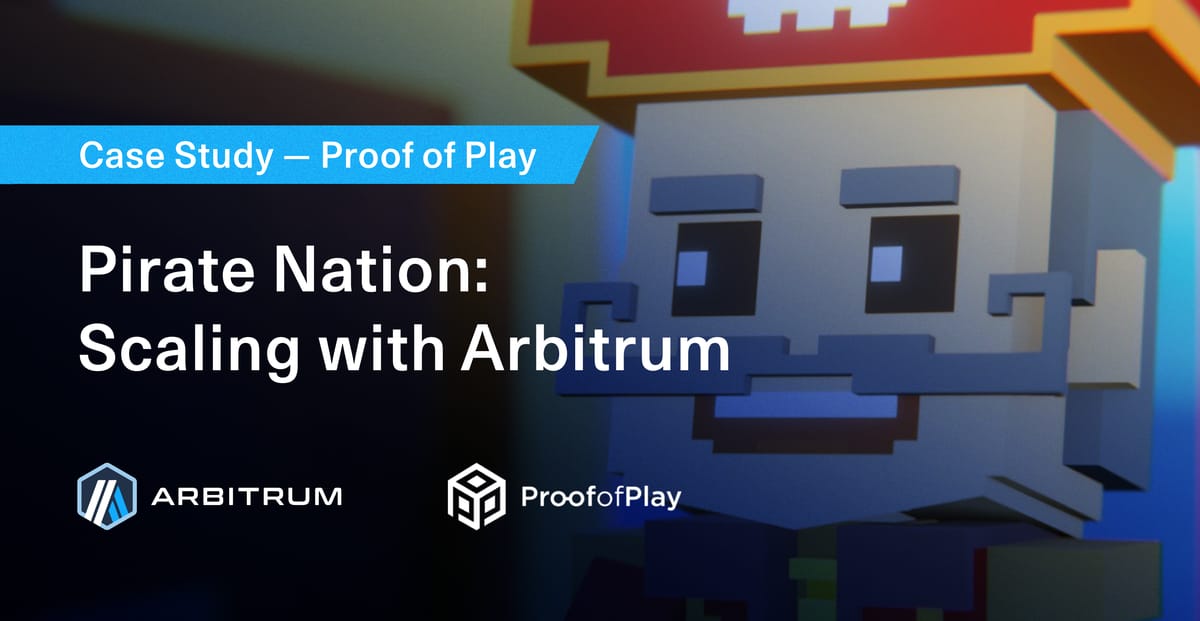Building the Future of Gaming: How Proof of Play Scaled Pirate Nation with Arbitrum

What is Proof of Play?
Proof of Play is a blockchain gaming studio focused on developing fully onchain games where players have actual ownership of in-game assets. They aim to create fun, accessible, and decentralized gaming experiences that don't require complex blockchain knowledge.
What is Pirate Nation?
Pirate Nation is a blockchain-based strategy RPG that immerses players in a world of high-seas adventure, treasure hunting, and naval combat. Developed by Proof of Play, players can own, trade, and upgrade in-game assets like ships, crew members, and weapons, all while exploring vast oceans, completing quests, and engaging in PvP naval battles to build their pirate empire.
Pirate Nation's emphasis on gameplay makes it one of the more accessible Web3 games. The game supports casual and competitive players through PvE and PvP challenges, seasonal events, and special missions. By seamlessly integrating blockchain elements into its gameplay, it creates an environment where players can enjoy the experience regardless of their familiarity with crypto or NFTs.
Case Study
Opportunity
Pirate Nation is a fully onchain game, meaning all of its game logic runs on the blockchain through smart contracts. This design choice makes the game uniquely transparent - players can verify every game mechanic and rule instead of relying on hidden server-side code. However, running complex game logic onchain requires a blockchain that can handle transactions quickly and cost-effectively to maintain a smooth user experience.
The game initially launched on Polygon, where transaction costs reached approximately tens of thousands of dollars per month at peak usage, making the game economically unsustainable. A subsequent move to Arbitrum Nova dramatically reduced by a factor of ten while providing faster transaction speeds, making it more viable for running complex onchain game logic. However, as Pirate Nation's popularity grew, the game began consuming too much blockspace on Nova, which meant that scaling further would require additional blockspace.
This challenge revealed a fundamental limitation in existing blockchain infrastructure: no single chain could provide the combination of speed, cost-effectiveness, and dedicated blockspace needed to support a complex onchain game with thousands of concurrent players. Traditional blockchain architectures forced games to compete for blockspace with other applications, leading to unpredictable performance and costs. As the team at Proof of Play reflected on this, they reached a crucial realization: "We realized we needed to build our own chains, but also that we loved working with Arbitrum's tech,” Matt Van, CTO at Proof of Play, said. This insight would prove pivotal in Pirate Nation's search for a solution providing complete control over gaming infrastructure while maintaining blockchain technology's security and decentralization benefits.
Solution
The answer came through Arbitrum's Orbit framework, which enabled Proof of Play to build customized Layer-3 blockchains: Apex and Boss. Arbitrum Orbit allowed Pirate Nation to create dedicated chains optimized for gaming needs. The solution fundamentally transformed the operational model in several powerful ways.
Proof of Play moved to an infrastructure-level cost model rather than paying gas fees for each player's action. This change made the game's economics more predictable and sustainable, as costs could be managed at a systemic level rather than fluctuating with each transaction.
Additionally, running parallel chains through Apex and Boss allowed Pirate Nation to distribute its player load much more effectively. When thousands of players engage simultaneously in battles, trades, and quests, their actions are split across both chains, maintaining consistent performance during peak periods. This approach solved the scaling challenge while keeping the game's economy unified across both chains.
Working with Conduit, Proof of Play optimized these Layer-3 chains for gaming operations. The team pushed Orbit's capabilities to process 70 million gas per second, setting new performance standards for blockchain gaming. This level of optimization was only possible because the chains were purpose-built for Pirate Nation's specific gaming needs
Performance and Growth
Pirate Nation's decision to become an Arbitrum Orbit chain has delivered remarkable performance improvements. Arbitrum's foundational speed advantage, with block times of just 250 milliseconds, provides the essential backbone for responsive gameplay. According to Van, the system can process up to 70 million gas per second, setting new benchmarks for blockchain gaming performance.
In fact, Pirate Nation’s Apex and Boss chains have exhibited consistently high gas consumption, a clear indicator of strong user engagement. Apex, which launched in Feb 2024, has seen gas fee consumption of over 427 trillion gwei. On a similar trajectory, Boss, which launched in July 2024, has seen gas fee consumption of over 136 trillion gwei. Data from rollup.wtf shows that the Proof of Play chains frequently rank among the highest in Mgas/S, even surpassing many general-purpose chains. This level of onchain activity highlights not only the efficiency of Arbitrum’s infrastructure but also the growing demand for a fully onchain gaming experience.
These technical capabilities have translated into tangible benefits for Pirate Nation's players. The game now supports tens of thousands of concurrent users while maintaining consistent performance. Transactions confirm almost instantly, allowing for smooth gameplay that rivals traditional gaming experiences. The dedicated blockspace ensures that game actions execute reliably, regardless of activity on other blockchain networks.
Pirate Nation’s success has established new standards for blockchain gaming infrastructure and provided a blueprint for future projects in the space. By leveraging Arbitrum technology, Proof of Play has opened new possibilities for the entire blockchain gaming industry by solving the fundamental challenges of speed, cost, and scalability.


































